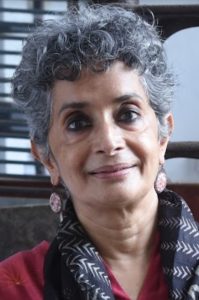M K Nambyar Annual Lecture 2024 | Prof. Nivedita Menon, Centre for Comparative Politics and Political Theory, JNU
Krishnappa Hall, OAB – 201, NLSIU
Tuesday, July 9, 2024, 5:00 pm
Public Lecture
We are excited to announce that Prof. Nivedita Menon, Centre for Comparative Politics and Political Theory, Jawaharlal Nehru University, Delhi, will deliver the MK Nambyar Annual Lecture for 2024 on 9th July. NLSIU Faculty, Dr. Salmoli Choudhuri will be the moderator.
The talk will be delivered on the topic ‘Insurgent constitutionalism and Radical frames of citizenship’ from 5 PM to 6.30 PM, in the Krishnappa Hall, OAB – 201, NLSIU.
About the Speaker
 Nivedita Menon is a Professor at the Centre for Comparative Politics and Political Theory, Jawaharlal Nehru University, Delhi. Her latest book is Secularism as Misdirection: Critical Thought from the Global South (Permanent Black and Duke University Press 2023). Apart from research papers in Indian and international journals, her previous books are Seeing like a Feminist(2012/updated 2nd Edition 2022), Recovering Subversion: Feminist Politics Beyond the Law (2004); and (co-written) Power and Contestation: India after 1989 (2007/2nd Edition 2014). She is a regular commentator on contemporary issues on the collective blog kafila.online (of which she is one of the founders). She has translated fiction and non-fiction from Hindi and Malayalam into English, and from Malayalam into Hindi, and received the AK Ramanujan Award for translation instituted by Katha.
Nivedita Menon is a Professor at the Centre for Comparative Politics and Political Theory, Jawaharlal Nehru University, Delhi. Her latest book is Secularism as Misdirection: Critical Thought from the Global South (Permanent Black and Duke University Press 2023). Apart from research papers in Indian and international journals, her previous books are Seeing like a Feminist(2012/updated 2nd Edition 2022), Recovering Subversion: Feminist Politics Beyond the Law (2004); and (co-written) Power and Contestation: India after 1989 (2007/2nd Edition 2014). She is a regular commentator on contemporary issues on the collective blog kafila.online (of which she is one of the founders). She has translated fiction and non-fiction from Hindi and Malayalam into English, and from Malayalam into Hindi, and received the AK Ramanujan Award for translation instituted by Katha.
About the Session
I will consider two themes in the lecture – constitutionalism as a radically transformative framework, and an expanded notion of citizenship. A Constitution is usually seen as a legal document that embodies a new dispensation or structure of power and which becomes a crucial reference point in the resolution of disputes between groups. However, that does not exhaust what Constitutions do. The hope inspired by the idea of a Constitution as the basis of a democratic state is as vibrant in the twenty-first century as in the mid twentieth, when the first wave of decolonisation took place across the global South. A comparison of Chile’s draft Constitution of 2022 and India’s enacted in 1950 yields some productive insights. We will also consider two movements in India that invoke constitutional morality – the queer movement and Pathalgadi. In addition we will consider the recently enacted Uttarakhand Uniform Civil Code as a violation of every principle of both consitutionalism and citizenship. The lecture will also question the idea of citizenship as inherently emancipatory, and consider what citizenship can look like when freed from the barbed wire borders of nation states.
Lecture Video

